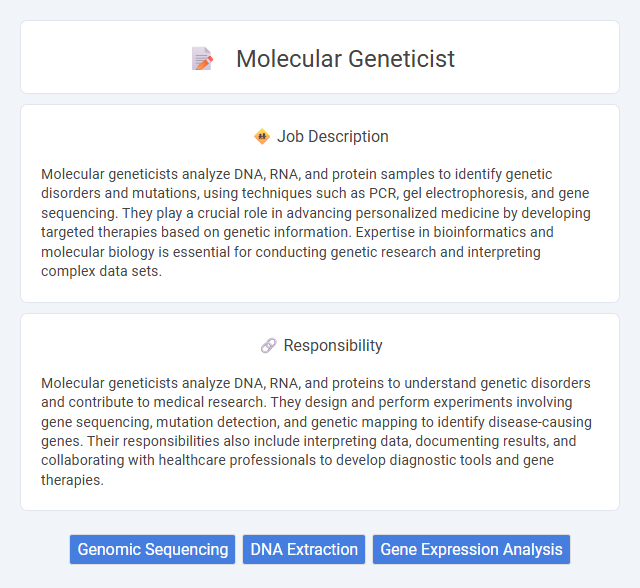
Molecular geneticists analyze DNA, RNA, and protein samples to identify genetic disorders and mutations, using techniques such as PCR, gel electrophoresis, and gene sequencing. They play a crucial role in advancing personalized medicine by developing targeted therapies based on genetic information. Expertise in bioinformatics and molecular biology is essential for conducting genetic research and interpreting complex data sets.
People with strong analytical skills and a keen interest in biology and genetics are probably well-suited for a career as a molecular geneticist. Those comfortable with laboratory work, detail-oriented tasks, and interpreting complex data might find this role fulfilling. Individuals who prefer routine tasks or less technical environments may be less compatible with the demands of this job.
Qualification
Molecular geneticists typically require a master's or doctoral degree in molecular genetics, biology, or a related field, with extensive knowledge of DNA sequencing, gene expression analysis, and molecular cloning techniques. Proficiency in bioinformatics tools, laboratory skills, and experience with CRISPR technology enhances job performance and research outcomes. Certification from professional organizations and strong analytical skills are highly valued for advancing in genetic research and clinical applications.
Responsibility
Molecular geneticists analyze DNA, RNA, and proteins to understand genetic disorders and contribute to medical research. They design and perform experiments involving gene sequencing, mutation detection, and genetic mapping to identify disease-causing genes. Their responsibilities also include interpreting data, documenting results, and collaborating with healthcare professionals to develop diagnostic tools and gene therapies.
Benefit
Molecular geneticists probably experience significant benefits such as contributing to groundbreaking medical research and personalized medicine, which can improve patient outcomes. The role may offer opportunities for collaboration with leading scientists and access to cutting-edge technology, enhancing professional development. Stable demand in healthcare and biotechnology industries likely results in competitive salaries and job security.
Challenge
Molecular geneticists likely face the challenge of interpreting complex genetic data to identify disease-causing mutations, which requires a high level of analytical skill and attention to detail. The rapid advancement of genetic technologies probably demands continuous learning and adaptation to new techniques and tools. Ethical considerations around genetic information may frequently complicate decision-making processes in their research and clinical applications.
Career Advancement
Molecular geneticists can advance their careers by gaining expertise in emerging technologies like CRISPR and next-generation sequencing, which are in high demand in research and clinical settings. Pursuing advanced degrees such as a Ph.D. or specialized certifications in genomics and bioinformatics enhances opportunities for leadership roles in biotechnology firms, academic institutions, and healthcare organizations. Continuous professional development through publishing research and participating in scientific conferences significantly increases visibility and prospects for senior positions.
Key Terms
Genomic Sequencing
Molecular geneticists specializing in genomic sequencing analyze DNA sequences to identify genetic variations linked to diseases, enabling advancements in personalized medicine. They utilize high-throughput sequencing technologies and bioinformatics tools to decode complex genomes, facilitating the discovery of novel biomarkers and therapeutic targets. Precision in sequencing data interpretation is crucial for applications in genetic counseling, diagnostics, and research on hereditary conditions.
DNA Extraction
Molecular geneticists specialize in analyzing genetic material by performing DNA extraction to isolate high-quality nucleic acids from various biological samples. Their expertise in utilizing precise techniques such as spin-column purification, magnetic bead separation, or organic solvent extraction ensures the integrity and purity of DNA for downstream applications like PCR, sequencing, and genotyping. Mastery in DNA extraction protocols is essential for advancing research in genomics, hereditary disease studies, and personalized medicine development.
Gene Expression Analysis
Molecular geneticists specializing in gene expression analysis utilize techniques such as quantitative PCR, RNA sequencing, and microarrays to measure mRNA levels and identify regulatory mechanisms. Their work contributes to understanding gene function, disease pathways, and therapeutic target identification. Proficiency in bioinformatics tools and statistical analysis is essential for interpreting complex gene expression datasets and advancing personalized medicine.
 kuljobs.com
kuljobs.com